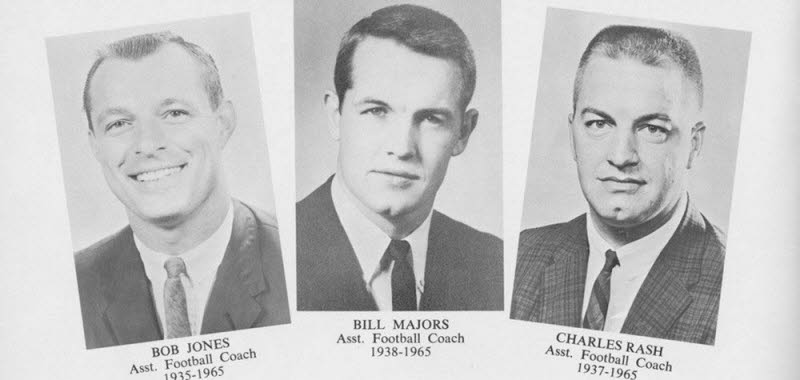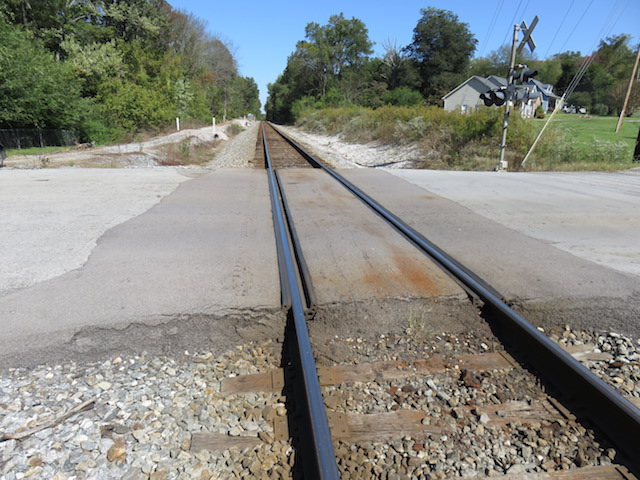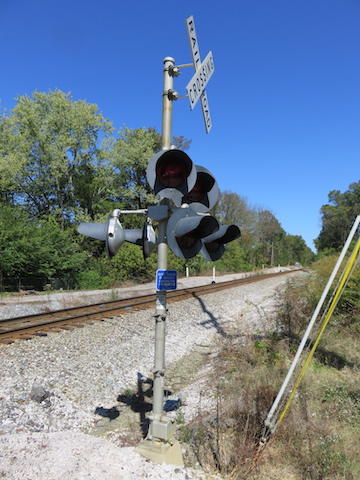
1965 Tennessee coaches killed in train-car crash
photo by University of Tennessee

Cessna Road railroad crossing in Knoxville where 1965 crash occurred
photo by John Shearer

Car with UT coaches in it came to rest on right in 1965
photo by John Shearer

Knoxville home at 737 Cessna Road where Vol coach Bill Majors lived in 1965
photo by John Shearer

1965 Knoxville home of UT coach Charlie Rash at 316 Forest Oak Drive
photo by John Shearer

One of the Deane Hill Apartment buildings in complex where UT coach Bob Jones lived in 1965
photo by John Shearer
A Southeastern Conference championship was not won, but the 1965 football season for the Tennessee Volunteers is still remembered quite fondly for all the hearts that were won.
While the play on the field after a number of down years would have been inspiring enough for Vol fans, it was made even more significant by what was overcome off the field.
During the early morning hours of Monday, Oct. 18, 1965, -- 50 years ago this week -- Tennessee assistant coaches Bob Jones, Bill Majors and Charlie Rash were traveling to work when they were hit by a train at a railroad crossing in West Knoxville.
Coaches Jones and Majors – the younger brother of former Tennessee coach and star player Johnny Majors – died instantly, while coach Rash died four days later at Presbyterian Hospital, later renamed Fort Sanders Regional Medical Center.
It was a nightmarish tragedy and made football seem insignificant.
But somehow the Vol family regrouped, and the team and coaches used the play on the field to warm all the badly bruised hearts ever so slightly. They would go on to finish with a very respectable 8-1-2 record.
On the weekend of the 2015 Arkansas game earlier this month, the 1965 team was recognized during the game on their golden anniversary. And on the Friday before, former coach Doug Dickey was recognized with the renaming of two sections of the UT athletic facilities in his honor. Also, a plaque memorializing the three coaches was unveiled, with coach Majors’ younger son, Mark, making heartfelt remarks.
By the time the tragedy took place in 1965, that Vols team had already shown signs of being the best Vols squad since the 1960 team that went 6-2-2.
Under 33-year-old coach Dickey, who was in his second year and had switched the Vols to the T formation after Tennessee ran the single wing for years, the team started the season 2-0-2. They opened with a 21-0 win over Army, a 13-13 tie against Auburn, and a 24-3 victory over South Carolina.
In the first road game of the year, the Vols realized they might have a pretty good team when they fought to an inspiring 7-7 tie against mighty Alabama at Birmingham’s Legion Field. The Crimson Tide was driving for a possible winning touchdown or field goal, but quarterback Ken Stabler, thinking it was third down, threw the ball out of bounds on fourth down at the 3-yard line late to stop the clock.
This tie definitely felt like a victory for Tennessee, but the happy feelings would be short lived, as the accident that claimed the lives of the coaches would take place two days later.
Coach Jones’ widow, the now-81-year-old Rosemary McClain, said over the telephone last week from her home in Tyler, Texas, that she still remembers much about that fateful week.
She had taken her three young sons -- Bobby, Stephen and Mark – to the McGhee-Tyson airport to greet the team after its arrival from Alabama. A picture of some of the coaches’ children standing at the fence to greet the team ran in the next day’s paper.
Having just settled in Knoxville, they were living in the Deane Hill Apartments across Gleason Road from what is now West Town Mall in West Knoxville. She remembered that the children were outside playing that Sunday morning while her husband read the paper before they went to church and he later went to the afternoon coaches meeting.
The next morning, Oct. 18, coach Jones left for work early. Ms. McClain remembered that he would always hitch a ride with a milk delivery truck a few hundred yards west to coach Rash’s home at 316 Forest Oak Drive. Coach Rash would then take them in his Volkswagen Beetle across the railroad tracks and then pick up fellow assistant coach Majors at 737 Cessna Road farther west near Westland Drive.
After they picked up coach Majors that day, they headed south on Cessna Road toward Westland Drive, with plans to turn left toward campus as they always did. But this time, a Southern Railway passenger train heading east with former Knoxville Central High football player James Pafford as the engineer smashed into and badly damaged the car, shattering the lives of multiple families in the process.
Ms. McClain – who remembers hearing the train whistle every morning and says the sound of a train whistle still gets to her after 50 years – said she first learned of the accident when head coach Doug Dickey’s wife, JoAnne, called her and asked if she had heard that coach Majors was in an accident.
“I knew right quickly they were all together but I didn’t know anything,” she said.
She then asked a couple of men who lived in the complex to call the hospital, but she did not know anything until she saw a car speedily zoom up to her apartment. In it were coach Dickey and assistant Vince Gibson.
“I went downstairs and met them and knew what they were going to tell me,” she said.
What followed was a whirlwind of activity for the dazed Ms. McClain. Her children were taken to a farm for the day, and the Tom Black family came to be with her, as did coach Jones’ family and others later that day.
After a memorial service the next day at what is now Church Street United Methodist Church by downtown Knoxville, they flew out to Texas for his burial in the community cemetery in Hearne. Among those who attended was coach Dickey.
It was in this town where the couple had been high school sweethearts. He was the star quarterback who was the son of the superintendent of schools, while she was a high school drum major who was a year older, she said.
Part of the reason for the large turnout for the funeral was because coach Jones was so popular in his former community.
“He would walk in the door and you felt like you knew him 100 years,” Ms. McClain said.
Back at Knoxville that week, the investigation continued. Literally thousands of saddened and curious Knoxville area residents descended that first day on the intersection where the crash had occurred.
The watch that coach Jones had from the 1957 Sugar Bowl when he quarterbacked Baylor to a win over Tennessee and Johnny Majors was found and it was stopped at 6:53 a.m., the apparent time of the crash.
Exactly what was going through the minds of the three coaches, particularly coach Rash, the driver, will never be known. Perhaps the car stalled, they did not see the train well, or maybe they were rushing to beat it so they would not be late for a coaches meeting.
The engineer, Mr. Pafford, was charged with manslaughter, which was called a “technical” charge. He was said to be going at a good speed and his train was late.
The next day, with Mr. Pafford off on a train trip toward Asheville, N.C., Southern Railway officials brought back that same train and used another VW to try and figure out what happened. Coach Rash’s VW had been knocked 96 feet down the train track and to the right side, while it took the train several hundred yards to stop.
Whatever was determined from subsequent legal proceedings might take additional researching, but city directories list Mr. Pafford as continuing to live at 1614 W. Adair Drive near the Fountain City area of Knoxville for several years after the crash.
Among those who went out to the crash site not long after the accident was Shirley Majors, the father of Bill.
Recently retired Baylor School baseball coach Gene Etter was in the same class on the football team at Tennessee with Bill Majors a few years earlier and said he remembers much about him. Although they were not best friends due in part to the fact that they lived in different areas of East Stadium Dorm in what became Neyland Stadium, he said they actually both played tailback on the varsity beginning their sophomore years in 1958.
“About mid-season Bill and I were considered to be equal, with Bill having the edge on defense (in those days before two-platooning) and I having the edge on offense,” he said.
They both continued to substitute regularly and were joined at the position during their junior and senior years by the talented Glenn Glass.
When they were off the field, coach Etter recalled that on one occasion the future coach Majors was in deep thought when coach Etter was talking to him casually, and he asked coach Etter to repeat what he said.
Coach Etter – who also remembered meeting coach Majors’ future wife, Lynnie, from Kingsport, while playing American Legion baseball in high school – said that Bill Majors also had a knack for fashion as a college student.
“He dressed upscale, having a stylish wardrobe,” coach Etter stated. “With his good looks, and his tendency for fine clothing, he could have been a good male model.”
Coach Etter ran into him a few other times shortly after their graduation, and followed his blossoming coaching career.
Many people think Bill Majors, and possibly coaches Jones and Rash, could have one day been college head coaches.
But due to that fateful event that occurred during the early morning hours of Oct. 18, 1965, Vol fans will never know what might have been.
However, as will be discussed in a part 2 story in the near future, inspiration still came from that tragedy, both on the field during the remainder of 1965 and off the gridiron in the years since.
Jcshearer2@comcast.net